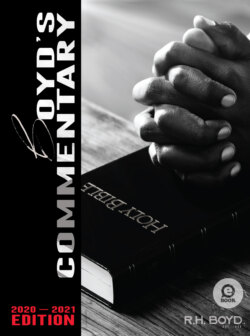Читать книгу Boyd's Commentary - R.H. Boyd Publishing Corporation - Страница 13
На сайте Литреса книга снята с продажи.
EXPOSITION I. HATE IN THE FAMILY (GENESIS 37:2–11)
ОглавлениеJoseph was the firstborn of Jacob’s favorite wife Rachel. This is why he loved Joseph more than all his other children and also because he was the son born in his old age, the eleventh son. Being favored and showing favoritism was part of Jacob’s legacy. He was favored by his mother Rebekah, and his father Isaac favored his older brother Esau over him. Jacob favored his second wife Rachel over his first wife Leah. Actually, Jacob never wanted Leah as a wife but was tricked by the sisters’ father, Laban, into marrying her. He then was given Rachel in marriage after a total of fourteen years of labor. This history of parental relationships certainly played out in the way in which their offspring were treated. Thus Jacob favored Joseph heavily for the reasons mentioned above.
Sibling rivalry and parental favoritism are a repeated theme within the stories of the families of Genesis. As mentioned, Jacob was favored by his mother and rivaled with his brother Esau. This pattern, however, was entrenched as it was three generations deep. Abraham favored his son of his wife, Isaac, over his son of his slave, Ishmael, ultimately leading to Ishmael and Hagar’s removal from their home. Parental favoritism and sibling rivalry have catastrophic results as forecasted by the stories mentioned above and the Cain and Abel narrative of Genesis 4.
Jacob overtly flaunted his favoritism for his younger son by gifting Joseph a specially-made tunic. This further spurred ire and rage against Joseph when his brothers saw that their father loved him more than them. They hated him and could not speak peaceably to him to the extent that their resentment could not be abated. Their anger toward Joseph was kindled by sight. The Hebrew in this text indicates that as they saw Jacob’s bias, as they saw the tunic representing Jacob’s favoritism, their hatred for Joseph was renewed each time they saw him. It was a cycle of close quarters—at each turn they saw something so that whenever they saw Joseph, they could not stand the sight of him.
Joseph didn’t help matters when he pressed his brothers to hear the dream God gave him. In his artlessness and infantilism, he shared the dream, not to offend or boast but hopefully to impress. His brothers, however, were not impressed. Instead they disdained him all the more. In one of his dreams, the sheaves of Joseph and his brothers were symbols of their lives and what was to come. Joseph’s sheaf stood upright while the sheaves of his brothers stood all around and bowed low in symbolic subjection to Joseph’s. In the second of Joseph’s dreams, the sun, moon, and eleven stars all were bowing to him. Whatever Joseph’s intent in telling the dreams, wisdom dictated he should have been quiet.
Joseph’s dreams gave evidence to his special purpose, but he was most naive in thinking his brothers would rejoice along with him. This was only another reminder for them. His father rebuked him when Joseph told his dreams again in front of him and his brothers. The content of the second dream undermined Jacob’s position as head of household and indicated he and Joseph’s mother along with his brothers would bow down before Joseph in subjugation. The end result of the dream episode was the hot jealousy of the brothers. Jacob, however, guarded the conversation without passing judgment and instead kept the matter close to his heart. Ironically the brothers, who reacted in an emotionally charged manner against the dream, were the ones who ended up fulfilling it. While Jacob, who did not react poorly, did not end up being part of its fulfillment in later chapters.
